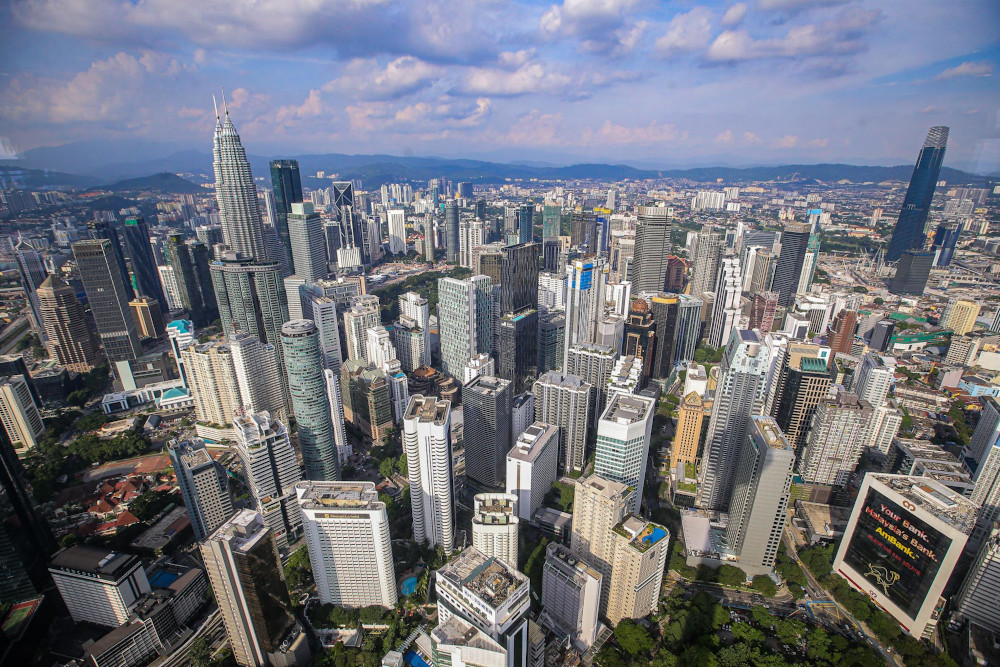KUALA LUMPUR, Aug 14 — The massive 17.1 per cent gross domestic product (GDP) contraction in the second quarter (Q2) 2020 has so far made Malaysia the worst-performing economy in Asean.
For Malaysia, the figure is the worst double-digit quarterly contraction since 1998, or about 22 years, following the unprecedented lockdown imposed to stem the spread of Covid-19.
This has forced Bank Negara Malaysia (BNM) to revise down the country’s 2020 GDP forecast to -3.5 to -5.5 per cent from -2 to 0.5 per cent previously, as the initial assumption was based on a lockdown period of only four weeks instead of seven weeks.
BNM governor Datuk Nor Shamsiah Mohd Yunus today said the economy was expected to recover and post a growth of 5.5 per cent to 8.0 per cent in 2021.
Regionally, Singapore recently announced that its GDP shrank by 13.2 per cent in Q2, sending the country into its first technical recession in 11 years.
The republic’s Ministry of Trade and Industry (MTI) when releasing the latest Economic Performance in Q2 2020, narrowed the GDP forecast range for 2020 to -7.0 to -5.0 per cent, from -7.0 to -4.0 per cent.
Concurrently, Indonesia’s economy enter a technical recession in Q2, after its GDP contracted 5.32 per cent, the lowest it recorded since the first quarter of 1999.
It was also reported that about 3.7 million individuals have lost their jobs this year, with the total number expected to hit around 10 million by year-end.
The Philippines’ economy shrank into a technical recession in April-June period as its GDP slumped 16.5 per cent, the sharpest decline since 1981.
The only country that recorded a positive growth so far in Q2, albeit slower than a year earlier, is Vietnam which saw its economy grow 0.36 per cent, with Prime Minister Nguyen Xuan Phuc committing to keep growth at above 5.0 per cent.
Other countries have yet to announce their Q2 data, with Thailand’ economy predicted to contract by 12 — 13 per cent, which would be a record negative growth for the Land of the White Elephants.
Bank Islam Malaysia Bhd chief economist Mohd Afzanizam Abdul Rashid said Malaysia’s economy was expected to decline deeper in 2020, with the bank revising its full-year 2020 forecast from -1.5 per cent to -4.0 per cent.
He said the pandemic had caused the economy to be at a standstill with 735 industries having recorded a contraction in output.
“As the economy continues to be operational, albeit gradually, we can expect economic activities to pick up steam in the third quarter 2020 and would continue in the final three months of the year,” he told Bernama.
Furthermore, he said the expansionary fiscal policies adopted by the government and accommodative monetary stance by BNM should help to steer the economy for the rest of the year and into next year.
“Developments over vaccines also seem to point to a promising prospect in light of the recent testing conducted by the pharmaceutical and biotech companies, with some having gone into the advanced stages.”
Mohd Afzanizam said another 25 basis points cut in the overnight policy rate (OPR) was quite likely.
“There are certain industries such as tourism and aviation that may not be fully operational in the immediate term especially when travelling across countries are still very much limited.
“Therefore, the onus is on the domestic engine to offset the external weaknesses as internal trade gradually recovers,” he added.
Bank Muamalat Malaysia Bhd economist Izuan Ahmad said going forward, the country’s economy was expected to undergo a ‘bumpy’ road to recovery.
“Malaysia’s road to economic recovery within the final two quarters of 2020 would need other contributors, especially private consumption, to improve and enhance its economic growth.
“This is still with the assumption that the ongoing Covid-19 pandemic could be contained by the end of the year, and overall return to normalcy could be achieved by next year, with positive GDP growth,” he added.
Izuan said the other sectors that recorded the highest contractions included net exports which declined 38.6 per cent, which signified that the country’s external trade performance was hampered by constrained business activities worldwide and interruptions in global supply chain.
Public investment also dropped 38.7 per cent as the government was more concerned with providing aid and support to those adversely affected by the pandemic and resulting movement control order (MCO) periods.
Malaysia recorded a a marginal growth of 0.7 per cent in the first quarter of this year, bringing the first-half 2020 GDP to -8.3 per cent as compared with a growth of 4.7 per cent in the first half of last year. — Bernama
















.jpg)






